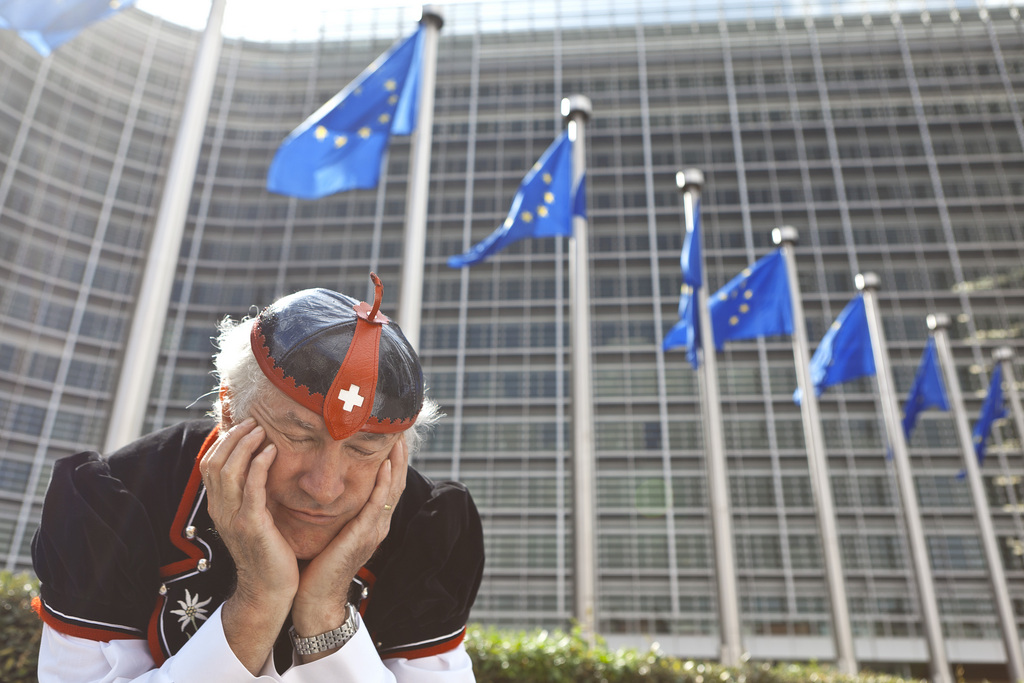Ambassador sets the tone for talks with EU

The European Union has set a minimum benchmark for talks with Switzerland about the future of bilateral relations. Richard Jones, EU ambassador to Bern, said it was crucial to agree on house rules.
“The integrity of the single market is the bedrock of the integration process,” Jones told journalists on Friday. Last month the EU Council adopted its response to the Swiss government’s proposals to solve differences on institutional issues. The conclusions were confirmed in a letter by European Commission president, José Manuel Barroso.
Jones said the present system of a multitude of static agreements with Switzerland, each dealing with specific sectors, was coming to an end and needed to be reconsidered.
The EU was seeking an “overarching arrangement” for Switzerland’s overall participation in the single market.
He said he was confident about a high-level meeting between representatives from the EU and the Swiss foreign ministry at the end of this month.
“If the political will is there, there’ll also be a solution. I hope Switzerland will be able to make a qualitative leap ahead towards an all-encompassing solution which will put our relationship onto a stable basis.”
He said the agenda of the exploratory discussions still had to be finalised. In a first step it was necessary to look at the specific issues which separate Bern and Brussels, notably the key institutional issues – the automatic adaption of EU law, and an international arbitration body.
Switzerland and the EU have concluded more than 120 bilateral accords on a broad range of issues.
They include the 1972 free trade treaty and the 1999 free movement of people accord, regulating access to the labour markets of Switzerland and the 27-nation bloc.
In 1992 Swiss voters narrowly rejected the European Economic Area treaty, a halfway house to EU membership.
Brussels wants Switzerland to take over EU law automatically pertaining to the accords and an international arbitration body to rule in controversial cases.
Under domestic pressure to stem immigration, the Swiss government last year decided to limit the number of workers from eight eastern EU member states.
EEA as a benchmark
Jones said the European Economic Area (EEA) accord – a halfway house to full EU membership, but rejected by Swiss voters in 1992 – was the benchmark.
It is an efficient system providing the legal certainty needed to continue on the bilateral path with Switzerland, he explained.
However, he did not rule out other options.
“It offers an inspiration, but if there are other answers, there are other answers,” he added. “We’re open to other solutions than the EEA, but they should be just as good.
“Now we have to see issue by issue how we can bridge the gap between us.”
He said a possible visit by Barroso to Switzerland also depended upon progress made in the exploratory talks.
Immigration quotas
Jones said the dispute over Switzerland’s decision to re-introduce immigration quotas for eight eastern and central European states last year underlines the need to find a legal framework agreement.
There is no legal basis for such a discriminatory move, according to Jones.
Switzerland says terms to invoke the clause were fulfilled to restrict immigration from the so-called EU-8 member states.
Jones refused to speculate on possible measures by the EU, if the Swiss government were to extend the quota system or if voters refused to grant Croatia, which is due to join the 27-nation bloc in July, access to the Swiss labour market under EU rules.
Several mainstream political parties have been calling on the government to continue a temporary immigration cap until 2014. The government is also facing pressure from two extra-parliamentary proposals to limit immigration to Switzerland.

More
Switzerland and the EU
No link
Jones said the EU was interested in concluding a bilateral accord with Switzerland on electricity, but “the integrity of the single market is even more interesting for the EU.”
Another financial contribution by Switzerland towards efforts to eliminate social and economic disparities between old and new EU members – known as cohesion payments – will not be linked directly to the institutional issues.
He refused to give a precise amount of money expected from Switzerland, but stressed that the single European market had won an additional 100 million consumers, and that this also benefited Swiss businesses.
A 2006 nationwide vote in Switzerland paved the way for a payment of just over SFr1.26 billion ($1.36 billion) to 12 new EU member states.
Asked whether Brussels was insisting on a global agreement to avoid tax evasion, Jones said the EU was taking a pragmatic stance.
“It accepts the fact that Switzerland has reached agreement with a number of member states. In the long run we continue to want to see a global solution.”
Switzerland concluded accords with Britain and Austria and it is negotiating similar deals with Italy and Greece. An agreement with Germany was rejected by the parliament in Berlin.

In compliance with the JTI standards
More: SWI swissinfo.ch certified by the Journalism Trust Initiative












You can find an overview of ongoing debates with our journalists here . Please join us!
If you want to start a conversation about a topic raised in this article or want to report factual errors, email us at english@swissinfo.ch.